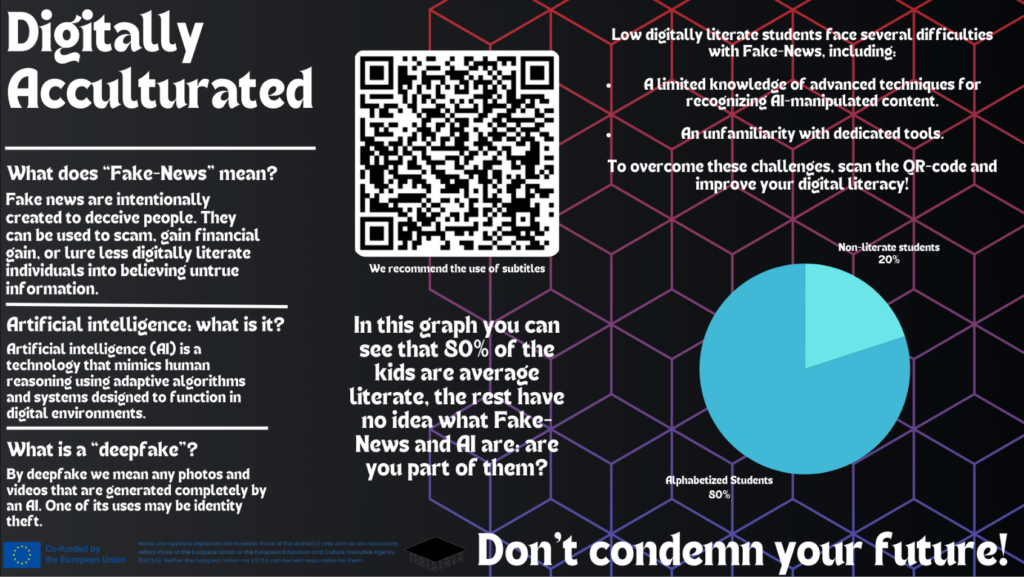Authors: Paolo Conti, Ignazio Pio Faraci, Francesco Ventura, Marco Viola
- Introduction Project Description:
The Learning Unit Plan (LUP) focused on crucial themes for contemporary digital society, such as artificial intelligence (AI), AI-generated content, and fake news. The main goal was to raise students’ awareness of the importance of developing critical thinking towards these phenomena to reduce the risks associated with misinformation and the improper use of technology.
Activity Objective:
Through a process of research, analysis, and communication, the project aimed to educate students and the school community on recognizing manipulated content and promoting responsible online behaviors. This objective was pursued through the creation of an informative poster designed to convey clear messages and practical tools for combating misinformation. - Project Phases
Research and Survey:
The project began with a survey administered to students from grades IV and V across various school disciplines. The questionnaire, composed of targeted questions, explored students’ knowledge of AI and fake news, their risk perceptions, and their habits in verifying information.
Data Analysis:
The survey results highlighted a good basic understanding of AI-related concepts (80%), but also deficiencies in the ability to recognize manipulated content, such as deepfakes. Only 40% of students reported being proficient in distinguishing fake news, often relying on basic techniques such as source verification.
Poster Creation:
Following the analysis, the group designed an educational poster featuring key messages, such as the dangers of fake news, practical tips for recognizing false content, and the conscious use of AI. Engaging visual elements, including graphs and representative images, were used to make the content clear and appealing. - Poster Content and Key Messages Essential Themes:
• Definition and risks of fake news and AI-generated content.
• Practical techniques for identifying manipulated content, such as source comparison and fact-checking tools.
• The importance of a critical approach to consuming online information.
Practical Tips:
• “Always check the sources and verify the date of the last update.”
• “Use online tools to check the reliability of images and news.” • “Compare various reliable sources before sharing content.” - Learning Experience Lessons Learned:
The group learned the importance of critical thinking and source verification to counter misinformation. Increased awareness of the risks associated with AI and fake news emerged.
Challenges Encountered:
One of the main challenges was collaboration, due to a team member’s poor health and the unexpectedly low quality of another member’s internet connection. Despite these obstacles, the team managed to collaborate effectively and complete the project.
Collaboration and Teamwork:
Teamwork allowed for the development of transversal skills such as communication, task division, and time management, which were fundamental to the project’s success. - Conclusions and Final Reflections Project Impact:
This project had a significant impact on both the group and the school, increasing awareness about misinformation and promoting practical strategies to tackle it. Students gained skills valuable not only for school but also for everyday life.
Future Perspectives:
In the future, it would be interesting to conduct a school-wide survey, as most students were unable to participate in the first one, to assess the posters’ impact on the student body.

0